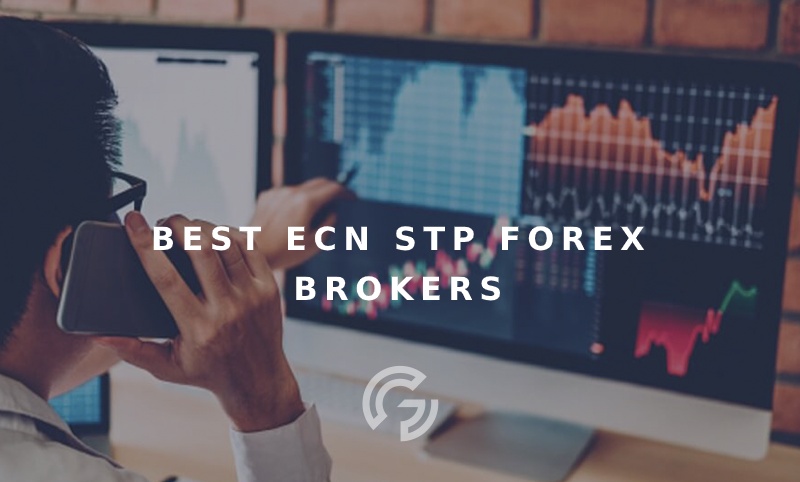Introduction
Selecting the best trading model is essential for traders who want to maximise their profits as well as minimise the risks. Two widely used trading models include ECN (Electronic Communication Network) and STP (Straight-Through Processing), with distinct advantages and drawbacks, based on what the traders’ objectives and preferences are. In this post, we’ll present a summary of ECN as well as STP trading models, and compare their key differences and then discuss the pros and cons of each model. We will also provide advice on how to choose the right model and also tips for trading efficiently using ECN or STP brokers.
ECN and STP trading models enable traders to trade directly with liquidity providers as well as access interbank markets. They both offer advantages over traditional market maker models, for example smaller spreads, quicker execution, and improved transparency. There are some notable variations between both models which traders must consider before selecting one.
Understanding ECN and STP
- Definition of ECN
ECN is a trading model which connects traders directly to liquidity providers like hedge funds, banks and other financial institutions. The ECN model works as a hub and matches buy and sell orders among various market players. This ensures that traders receive the highest possible price for their trades. ECN brokers charge a commission per trade, which is typically calculated as a percentage of the trade’s value. - Definition of STP
STP is a trading model that allows traders to perform transactions directly through liquidity providers, without the requirement for a dealing desk. STP brokers act as intermediaries between the liquidity providers and traders by processing orders in a seamless manner while minimising broker intervention. STP brokers can offer adjustable or fixed spreads based on the provider of liquidity they deal with.

Key Differences between ECN and STP
The primary difference between ECN and STP is the method in which they operate. ECN brokers function as a hub that matches buy and sell orders made by different market participants. STP brokers process orders directly with liquidity providers. ECN brokers will charge a fee for every trade. STP brokers can charge an additional markup or commission on the spread. ECN brokers have lower spreads and faster execution. They also provide better transparency. STP brokers provide seamless order processing, less trading costs, and better transparency.
Pros and Cons of ECN Trading
ECN trading has many advantages over traditional market maker models, like lower spreads and execution times, improved liquidity, and transparency of prices. But, there are certain disadvantages that traders must be aware of before choosing an ECN broker.
Advantages of ECN Trading
- Spreads are lower and expenses for trading ECN brokers offer lower spreads than traditional market makers, which will save traders cash on every trade. ECN brokers typically require a fee for every trade. This is usually not a fixed percentage, but may be cheaper than the spread markup.
- ECN brokers allow faster execution of trades as well as more liquidity. This allows traders to access and close trades at the highest price.
- Price transparency is improved ECN brokers give more transparency in pricing than traditional market makers. The trader can look at the rates offered by various liquidity providers and choose the most affordable price for their trades.
- Direct contact with liquidity providers ECN trading offers traders an opportunity to interact directly with various liquidity providers including institutions, banks, and other traders. This direct interaction can result in more favourable pricing and possibly better execution.
- ECN brokers do not trade with their customers, so there’s no conflict of interests. This means that there is no concern that your broker could manipulate prices to benefit themselves and create a fair trading atmosphere.
- Variable Spreads: Unlike other fixed spreads, ECN brokers provide variable spreads that reflect current market conditions. This means that during periods when markets are volatile spreads might widen however, during quieter periods, they can be incredibly tight.
- ECN trading gives traders the most comprehensive market information which displays the number of orders available and the sizes of those orders for various price levels. This information aids traders to make more informed decisions.
- Anonymous Trading: ECN trading allows for anonymity in which traders’ identities are not disclosed to the liquidity providers. This is advantageous for traders who don’t want their trading strategies exploited.
- ECN brokers are able to access interbank exchange rates. These are the rates banks and other large institutions utilise to trade currencies. This can result in lower prices and quicker execution for big trades.
- Scalping and High-Frequency Trading: ECN trading is well-suited for high-frequency traders as well as scalpers who need quick execution and low latency. Direct market access and rapid execution speed makeECN a perfect option for these strategies of trading.
- ECN brokers allow traders to trade smaller volumes than traditional brokers. This flexibility can be particularly helpful for traders who have limited funds or who wish to manage their risk more specifically.
- ECN Brokers Allow Traders to place Stop and Limit Orders Within the
- Spread. ECN brokers allow traders to place stop and limit orders inside the spread. This is advantageous to traders who wish to get into the market without being influenced in their entry prices by changes in spreads.
- There are no requotes due to the nature of ECN trading. The orders are executed according to their prices, without the broker refusing to accept the order or changing it due changes in the price.
Disadvantages of ECN Trading
- Trading costs are higher due to commissions. ECN brokers charge commissions per transaction. This could lead to significant trading costs. These costs should be considered by traders when selecting the ECN broker.
- ECN trading requires advanced strategies and skills in trading. Trading professionals must be able analyse market conditions, then execute trades efficiently and swiftly.
- Possibility of Slippage ECN trading aims to provide rapid and efficient execution of orders however, there is a possibility of slippage during times of high market volatility. This means that the price at which you execute may differ from the price you planned to trade at.
- There is a limited availability of Exotic Pairs: Some ECN brokers might have limited options for exchange rates, and focus more on major and minor pairs. People who are interested in trading exotic currency pairs may find less options than traditional brokers.
- Minimum Deposit Requirements Some ECN brokers may impose higher minimum deposit requirements when compared to other brokers. This could pose a challenge to traders with a small initial capital.
- ECN brokers generally have fee structures that incorporate commissions and spreads. Some traders might find it difficult to assess the impact of these fees on their trading expenses and know how to deal with them.
- Higher Initial Learning Curve: Because of the complex nature of ECN trading, new traders may be faced with a more challenging learning curve when compared with other trading methods. It could take a significant amount of time and effort to learn how to operate in the ECN environment.
- More emphasis on technical analysis: Successful ECN trading relies largely on technical analysis and chart patterns. ECN trading is more technical-oriented and traders who prefer fundamental analysis may have a difficult time adjusting.
- Requirement to have a Robust Internet Connection: ECN trading requires a stable and fast internet connection. Traders need to ensure they have the right infrastructure in place to maintain a reliable connection during trading hours in order to be able to avoid disruptions.
- Market Depth May Not Be Always Available: Even though ECN brokers offer enhanced market depth information however, there are occasions where market depth data is not always visible due to sudden shifts in the market or low liquidity periods.
- Potentially, overnight financing costs: Positions that are held overnight in the ECN model may result in overnight financing costs, depending upon the differentials in interest rates between the traded currencies.
- For traders who aren’t experienced, they may be overwhelmed by the rapid nature and amount of information available in real-time. It can take time for newbies to get used to the pressure to make fast decisions.
Pros and Cons of STP Trading
STP trading has features that are a mix of ECN and Market Maker models, such as seamless order processing and lower trading costs. However, there are some disadvantages that traders should be aware of prior to choosing an STP broker.
Advantages of STP Trading
- Combining the features of ECN and market maker models: STP brokers combine the features of ECN brokers and market makers, providing smooth order processing, as well as lower prices for trading.
- STP brokers offer lower trading costs when they are compared to traditional market makers. They handle orders directly through liquidity providers and don’t mark up spreads.
- STP brokers offer transparent pricing, often by aggregating quotes from multiple liquidity providers. This allows traders to look at real-time bids and ask prices and creates a fair trading environment.
- A lower risk of price manipulation Because STP brokers don’t act as counterparties to your trades, you have the possibility of less manipulation. This can boost confidence and trust in trading procedures.
- No Dealing Desk (NDD) Execution: STP brokers typically offer No Dealing Desk (NDD) execution which means that orders are handled immediately without broker intervention. This may lead to quicker executions and fewer rejections.
- Access to institutional liquidity STP brokers can access institutional liquidity. This allows traders to benefit from lower spreads and better execution quality.
- Diverse Assets: STP brokers provide an array of trading instruments such as commodity and forex as well as indices and. It allows traders to diversify portfolios and explore different opportunities in the market.
- STP Trading is Suitable for Different Trading Styles. STP trading can accommodate different styles of trading, such as swing trading, day trading, as well as long-term strategies. STP lets traders use their preferred trading strategies.
- STP Brokers are Scalping-Friendly Because of their direct order routing as well as the efficient execution system they use, STP brokers often accommodate scalpers. The speedy processing of orders can be beneficial to traders who are involved in rapid trades.
- STP Trading seeks to minimise conflicts of interests, similar to ECN trading models. The success of the broker is aligned with the trading success.
- Flexible Trade Sizes: STP brokers often allow for flexible trade sizes permitting traders to carry out positions of varying sizes, from micro-lots to standard lots, depending on their methods of managing risk.
- Market-Neutral Execution: STP trading offers market-neutral execution in that trades are routed directly to the market, and without the broker’s involvement. This helps traders avoid potential biases that might arise from broker interference.
Disadvantages of STP Trading
- Conflicts of interest between traders and brokers: STP brokers could have conflicts of interests because they are compensated by liquidity providers to arrange trades exactly in the same way.
- Less transparency compared to the ECN model STP brokers might not provide as much transparency as ECN brokers as traders are not aware of the prices of bid and ask of the various liquidity providers
- Possibility of Requotes. Although STP is designed to ensure an efficient execution process, there’s the possibility of the possibility of requests. This is particularly the case during periods of high fluctuations in the market. Requotes may occur when the price is no longer available this can lead to delays in order execution.
- STP brokers can have spreads that fluctuate and can rise in volatile markets. The spreads that traders are offered could be restricted, which could have an impact on the costs of trading.
- Order Execution Times Can Vary: STP speeds can change according to the market as well as the technology infrastructure of brokers. Traders may experience delays during trading hours that are peak that can impact trade entry as well as exit.
- Potential for Slippage: Similar to ECN trading, slippage may be experienced in STP execution as well. Traders may experience slippage when the execution cost is different from the price they intended due to rapid market movements.
- Some STP brokers require larger sums of deposit to create an account. This could be a barrier for traders with small capital who would like to start trading with smaller amounts
- The lack of depth of Market Information: In contrast to ECN brokers who provide deep market data, STP brokers may not provide the same amount of information into the available liquidity at various prices.
- It is possible to reject orders. STP brokers may reject orders in a few instances in particular if the situation in the market or issues with connectivity are not in favour. It could result in missing trading opportunities.
- Risk of Overloading in High Risk of Overloading during Extreme Market Volatility, STP Brokers may experience delays and technical issues because of increased trading activity. This could affect the execution of trades.
- Limited Availability of Advanced Features Limited availability of advanced features STP brokers might lack advanced features and trading tools than ECN brokers. Traders who rely on specific tools for their trading strategies could consider this to be restrictive.
- Varied Quality of Execution: The quality of execution could differ across different STP brokers. Traders may need to thoroughly investigate and choose a reputable STP broker in order to guarantee consistent and safe execution.
Choosing Between ECN and STP
The choice between ECN and STP depends on several factors, such as trading style, volume and the goals of trading. Investors should be aware of the following factors when choosing between ECN and STP:
Factors to Consider
- Trading style, frequency, and volume: Traders with a high trading volume and frequency may benefit from ECN trading because it can speed up execution as well as better liquidity.STP trading is a good option for traders with lower volumes and frequencies. It offers lower costs.
- Long-term vs. short-term trading goals: Traders with long-term trading goals may benefit from ECN trading because it allows for greater price transparency and increased liquidity. STP trading is a good option for traders who have short-term targets due to the fact that it allows faster execution and lower costs.
- Risk tolerance and preferred spreads: Traders with an extreme risk tolerance and preference for lower spreads might benefit from ECN trading because it is a lower-cost option for spreads. Traders with lower risk tolerance and a preference for larger spreads could benefit from STP trading, as it is less expensive to trade.
- Market Volatility: Evaluate your level of comfort with market volatility. If you thrive in fast-moving markets and are able to make swift decisions under pressure, ECN trading might align with your style. If you are looking for an easier-to-predict and stable trading environment, STP brokers may be the right choice.
- Time Commitment: Decide the amount of time you’ll need to commit to trading. Access to markets directly, speedier execution and ECN trading are beneficial to active traders who observe markets and conduct a number of trades. The STP’s cost efficiency could be better suited to those with a limited time frame trading, as they can make fewer but potentially more profitable trades.
- Tools and Trading Platforms Explore the various platforms and tools provided by ECN brokers as well as STP brokers. Choose a trading platform that is the most appropriate for the way you trade and has the essential features needed for analysis of technical aspects, order processing, and risk management.
- The size of your trade: think about the average size of the trade you’re planning to complete. ECN brokers are an excellent option for traders who have large volumes. Their vast liquidity enables them to process orders of all sizes without creating a huge effect on the marketplace. STP brokers may be more suitable for traders seeking to trade with smaller amounts and looking to increase their profits.
- Market Access: Determine which markets and securities are accessible to you. ECN brokers provide a broad selection of financial instruments like forex pairs and commodities. They also offer access to commodities, indices and even cryptocurrencies. If you’re interested in trading diverse markets and currencies, an ECN broker may provide the range of assets that you’re searching for.

- The importance of regulatory compliance when looking at both ECN and STP brokers. Confirm that the brokers’ regulation is overseen by well-respected authorities within the world of trading. The regulation gives traders an additional layer of security and guarantees an ethical trading environment while safeguarding their investments.
- Customer Support: A reliable customer support team is essential for any queries or issues that you may encounter during your trading journey. Assess the responsiveness, availability and quality of customer support from both ECN and STP brokers. Brokers with excellent customer support are able to provide assistance.
- Types of orders: Different trading strategies demand different types of orders. You should consider the types of orders that are provided by ECN and STP brokerages. Your chosen broker should support particular order types like limit orders, trailing stops and stop orders if the strategy you are planning to implement is based on them.
- Educational Resources: Education is vital, particularly for those who are new to the market. Investigate the quality and availability of educational materials provided by brokers of both kinds. These resources can include online learning materials, webinars, tutorials, and market analysis, which will help traders improve their skills and understanding.
- Broker Reputation: Learn about the reputations of ECN and STP brokers within the trading community. Review testimonials, reviews, and feedback from other traders to gauge the brokers’ reliability, transparency, and trustworthiness. A broker with a good reputation will likely provide you with a satisfying trading experience.
- Deposit and withdrawal methods: Consider the convenience and security of deposit and withdrawal methods offered by the brokers. Check to see if your preferred broker offers payment methods that work with your preferences and that they are able to make efficient transfers of funds.
- Demo Accounts Demo Accounts: ECN and STP brokerages have demo accounts to test their trading platforms. Demo accounts let you simulate actual trading conditions without risking actual funds. The experience will help you examine factors such as platform usability, order execution speed as well as the available features.
Determining the Right Model for You
The traders can decide on the most suitable type of model for their needs by considering their trading goals and preferences, and other aspects mentioned in the previous paragraphs. Before making a decision, traders should look at the features and costs of various ECN and STP broker options.
Hybrid Model: A Combination of ECN and STP
The hybrid model is an advanced fusion between the ECN trading system and the STP trading model. The ECN and STP trading models are widely used in the market, but the hybrid model brings together the best characteristics of both to build a platform that will provide a range of trading preferences and needs. Hybrid brokers generally offer a range of account types, including ECN accounts and STP accounts. This allows traders to customise their approach to trading based on their own specific needs.
Definition and Advantages
The hybrid model is based on direct market access, order matching and the effectiveness of the ECN model. This lets traders interact directly with liquidity providers within a transparent and efficient trading environment. The model also makes use of the STP model’s seamless order processing, lower expenses for trading and faster execution.

One of the major advantages of the hybrid model is that it has the potential to offer lower trading costs compared to traditional market makers. Through the efficient routing of trades to liquidity providers, and eliminating the spread markup, traders will profit from lower trading costs. Additionally, the hybrid model generally offers quicker execution time that meet the needs of traders who value speedy delivery of orders.
The hybrid model can provide efficiency, cost reductions, quick execution, and improved transparency of prices. It also improves liquidity. Traders gain insights into the depth of the market which allows them to make informed choices based on a comprehensive view of available prices of bid and offer. Transparency helps create a more educated environment for trading. This helps boost confidence among traders and allows them to make informed decisions.
Disadvantages Of The Hybrid Model
The hybrid model can offer many advantages but it’s crucial to recognize that it can have some restrictions. Like all trading models there are conflicts of interests that could be created between brokers and traders. Because hybrid brokers route trades to liquidity providers, traders must ensure they are choosing reputable brokers that adhere to ethical conduct to avoid such conflicts.
While the hybrid model can be described as very transparent, it’s not quite as effective as the ECN model in terms of revealing the bid and ask price from a variety of liquidity suppliers. Investors who want absolute transparency could choose the ECN model more appealing in this area.
Choosing the Right Hybrid Broker
When traders are exploring the hybrid model being explored, due diligence is required. Conducting research on different hybrid brokers and knowing their fee structures, account types, and additional services they provide is paramount. When comparing the different options and aligning them with personal preferences and goals in trading, traders can determine an appropriate hybrid broker to support their trading journey.
The hybrid model is a wonderful illustration of the continual innovation in the trading world. The model is intended to improve the experience of trading for a variety of traders by combining the strengths of ECN models and STP. The hybrid model, with its direct access to markets with order processing that’s seamless, less costly and enhanced liquidity, is evidence of how financial markets continue to evolve as well as the commitment of traders in providing them with optimal trading solutions.
ECN vs STP vs Market Maker
When it comes time to choose an investment model, traders will typically encounter three major options: ECN (Electronic Communication Network), STP (Straight-Through Processing), and Market Maker. Understanding the different features of each model is essential for making a well-informed decision. Each model comes with its own benefits and drawbacks. Check out the primary aspects of each model.

ECN (Electronic Communication Network)
ECN is a method of trading that connects traders to liquidity providers like financial institutions and banks. The ECN model acts as a hub which matches buying and selling orders from various market participants, making sure that traders receive the most competitive available price for their trades.
Here are some key points about ECN:
- Spreads are more affordable: ECN brokers have spreads that are generally less than market makers due to the fact that they mix prices from a variety of liquidity providers.
- Speedier execution: ECN brokers offer faster execution of trades, allowing traders to take advantage of market opportunities with no delays.
- ECN brokers increase liquidity since they connect traders to an extensive network of liquidity providers.
- Price transparency: ECN Brokers provide greater transparency in price transparency, as traders are able to review the bid and offer prices of different liquidity providers.
STP (Straight-Through Processing)
STP is a trading system that allows traders to make trades directly with liquidity providers without needing a dealing desk. STP brokers are intermediaries who serve as intermediaries between traders and liquidity providers. They process orders efficiently and minimise broker intervention.
Here are some key points about STP:
- Order processing that is seamless: STP brokers execute trades in a way that is automated and electronic, without any human intervention.
- Lower costs for trading: STP brokers usually offer lower trading costs compared to market makers, as they transfer the costs from liquidity providers without adding the markup.
- STP brokers come with a range of features. They are able to combine ECN and market maker characteristics, allowing them to achieve a more balanced balance between trading costs and execution.
Market Maker
Market makers are brokers that supply liquidity to the market by quoting both the prices to buy and sell for financial instruments. They establish a marketplace for traders to buy and sell and make money from the spread between the price of the bid and the asking prices. Here are some of the most important points about market makers:
- Instant execution: As the counterparties to the trader, market makers execute trades instantly.
- Conflicts of interest: Market-makers can profit from traders’ losses.
- Market makers offer wider spreads over ECN or STP brokers because they mark-up the price they quote.
Comparison of Trading Models
Here is a comparison of the key features and advantages/disadvantages of each trading model:
| Trading Model | Key Features | Advantages | Disadvantages |
| ECN | – Lower spreads
– Faster execution – An increase in liquidity – Price transparency |
– Costs of trading reduced
– Access to multiple liquidity providers – Price transparency has been enhanced |
– Higher costs for trading due to commissions
– Skills in trading are essential |
| STP | – The order processing process is simple
– Lower trading costs – Combining the features of ECN with market makers |
– Costs of trading reduced
– Improvement in execution – No conflicts of interests |
– There is less transparency in pricing compared to ECN |
| Market Maker | – Instant execution
– Conflicts of Interest – Wider spreads |
– Instant execution
– Market availability – No commission charges |
– Potential conflicts of interest
– Wider spreads – Less price transparency |
Tips for Effective Trading with ECN and STP Brokers
No matter what trading method is chosen, there are some best practices that traders can adhere to in order to improve their trading experience:
- Choose a reliable broker: Do thorough research to find a broker who has good reviews, is regulated and receives positive reviews from its clients.
- Implementing the best strategies for managing risk. Use risk management tools such as stop-loss orders and take-profit orders for securing and managing capital.
- Utilise Limit Orders judiciously. Make use of the limit order, especially when dealing with ECN brokers. You can specify the price you’d like to use to enter or exit your trade. This can be extremely useful in volatile times when you can anticipate rapid price changes.
- Diversifying your liquidity providers: ECN trading allows you to research brokers that provide many different liquidity providers. Diversifying your liquidity providers can boost execution quality and minimise potential delays in markets with high activity.
- Examine the Execution speed You can compare the execution speed with other brokers. It’s essential to examine the execution speed under various market conditions since both ECN and STP models are focused on speedy order processing.
- Certain news announcements can create volatility in both ECN as well as STP. Prepare yourself for such situations by altering your risk profile in the event of a rise in stop-loss levels or not trading during announcements of critical news.
- Keep Trade Records: Create a trade journal that documents all of your trades and strategies and the results. Examining past trades will provide you with valuable insights into your strengths and weaknesses.
Conclusion
Goals in trading can only be achieved by choosing the right trading strategy. ECN, STP and Market Maker each have their own advantages and disadvantages. Traders need to think about their trading goals and preferences before making a decision. Understanding the key differences and features of these models will assist traders in making educated decisions and optimise their trading experience. Remember to choose a reputable broker, implement proper strategies to manage risk and stay informed on the current market conditions to be successful in trading.
FAQs
Q1: What makes choosing the right trading model so important?
The correct trading method can have a profound impact on the trading experience. It influences factors like execution speed, costs, and the transparency of your trading, all of which can affect your success in the market.
Answer: Choosing the appropriate trading model will determine the efficiency of your orders, costs, and the degree of control over the trades you make. The best model will improve your strategy and results whether you’re trading on a daily basis or are a long-term investor.
Q 2: How does ECN operate, and what’s its key feature? What sets ECN apart from other trading models, and how does it provide traders with a unique advantage?
Answer: ECN is an electronic communications network that connects liquidity providers with traders to allow real-time matching between orders as well as execution. Direct market access is its key characteristic, which allows traders to contact liquidity providers directly, increasing transparency and decreasing spreads.
Q 3: Can you explain the main differences between ECN and STP?
Answer: While both ECN and STP prioritise efficient execution and transparency, they work differently. ECN emphasises direct market access as well as order matching and trade routing within an online network. STP emphasises the seamless processing of trades by routing orders through liquidity providers. The decision between them depends on your trading style, goals, and preferences.
Q 4: What advantages does the Hybrid Model offer?
Answer: The Hybrid Model is a blend of ECN and STP. It offers traders an ideal balance between speedy execution, cost-effectiveness, as well as transparency. This model can offer competitive spreads while minimising potential conflicts of interest that could occur in other models.
Q 5: How do I decide between ECN and STP trading models?
Which should I pick – ECN or STP? What should I take into consideration to make the right choice for my trading style?
Answer: Consider trading goals, trading volume as well as risk tolerance and the most preferred spreads. ECNs are a good option for traders who are active and want swift execution. STP is a better option for a moderate-risk trader who would like to be able to compete on costs.
Q 6: What’s the significance of choosing a reputable broker for ECN and STP trading?
Answer: Reputable brokers ensure that your transactions are conducted fairly and openly. They offer access to liquidity sources that are trustworthy. They also help you avoid conflict of interest and offer risk management tools. It is essential to select a broker that has a solid reputation to safeguard your investment and to achieve successful trading results.
References
https://cs230.stanford.edu/projects_fall_2020/reports/55813822.pdf
https://www.daytrading.com/stp-brokers
https://fxstadium.com/review/fxview/
https://leverageedu.com/blog/forex-market/
https://www.dumblittleman.com/ecn-forex-broker/
https://www.xcritical.com/white-label-forex-solutions/
https://en.wikipedia.org/wiki/Foreign_exchange_market
https://www.quora.com/What-is-the-difference-between-an-STP-and-an-ECN-broker-in-laymans-term
https://investingoal.com/ecn-vs-stp-brokers/
https://www.accuwebhosting.com/discussion/forum/peer-support/forex-vps/35829-what-is-the-ecn-broker
https://www.investopedia.com/articles/trading/05/011705.asp
https://myfxlist.com/the-difference-between-an-stp-and-an-ecn-forex-broker-explained/
https://money.usnews.com/investing/articles/what-is-an-ecn-broker
https://digicoincenter.com/review/fxview/
https://www.rba.gov.au/statistics/frequency/exchange-rates.html
https://admiralmarkets.com/education/articles/general-trading/types-of-brokers-ecn-stp
https://www.justice.gov/usao-sdny/pr/ceo-cryptocurrency-and-forex-trading-platform-sentenced-nine-years-prison-240-million
https://www.irs.gov/individuals/international-taxpayers/foreign-currency-and-currency-exchange-rates
https://capital.com/electronic-communication-network-definition
https://www.businessinsider.com/personal-finance/what-is-forex
https://online.nmims.edu/blog/top-10-things-every-forex-trader-should-know/
https://myfxlist.com/what-is-ecn-trading-and-what-are-its-advantages/
https://www.brokerxplorer.com/article/which-brokers-are-true-ecn-3936
https://www.valutrades.com/en/blog/what-are-the-advantages-of-an-ecn-forex-broker
https://www.financemagnates.com/thought-leadership/looking-for-an-ecn-account/
https://www.forex-central.net/ECN-NDD-STP-brokers.php
https://www.trade.gov/foreign-exchange-risk
https://www.thinkmarkets.com/en/partnerships/white-label/
https://fxstadium.com/best-ecn-forex-brokers/
https://blogs.oregonstate.edu/piperde/2022/10/12/6-advantages-of-using-an-ecn-forex-broker/
https://www.tcmb.gov.tr/wps/wcm/connect/en/tcmb+en/main+menu/statistics/exchange+rates/indicative+exchange+rates
https://en.wikiversity.org/wiki/Forex_Trading
https://www.forexfactory.com/thread/738166-tenkofx-crypto-ecn-forex-broker
https://blogs.cornell.edu/learning/why-trade-in-forex-and-how-to-become-a-successful-forex-trader/
https://www.xcritical.com/blog/ecn-broker-definition-benefits-and-platform-reviews/
https://www.cnbc.com/foreign-exchange/
https://forexf1.com/ecn-brokers-meaning-and-advantages/
https://fcraonline.nic.in/home/index.aspx
https://www.earnforex.com/ecn-forex-brokers/
https://tradersunion.com/interesting-articles/10-best-ecn-brokers/
https://55brokers.com/ecn-forex-brokers/
https://privacyaustralia.net/best-australian-ecn-brokers/
https://coesfx.com/stp-ecn-brokers/
https://www.wikifx.com/en/newsdetail/202205168414247566.html







